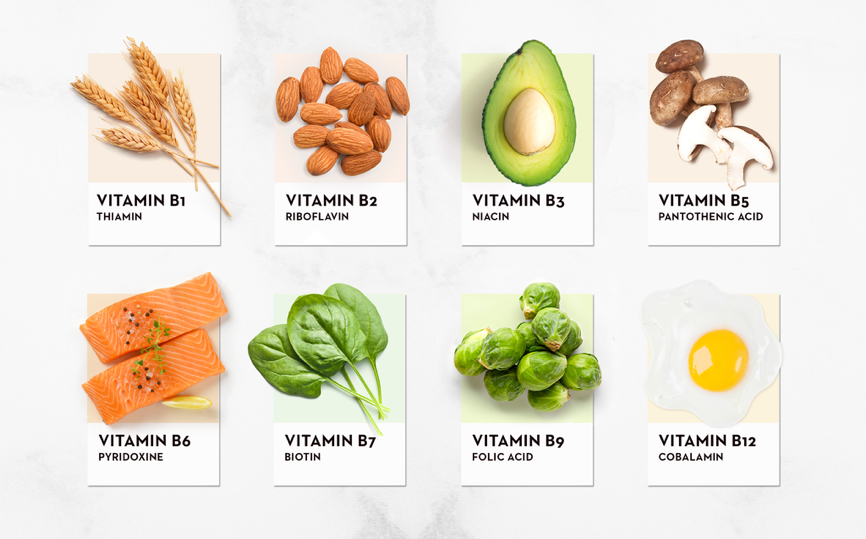ALL ABOUT VITAMIN B

Macronutrients – a.k.a. the big three – are made up of protein, fats, and carbs. Micronutrients, on the other hand, include all of the other important vitamins and minerals that our bodies need. B vitamins as a whole are super essential to overall cell function and DNA production, aka, keeping our body working and healthy every day. There are 8 specific B vitamins, typically known as B-complex: thiamine (B1), riboflavin (B2), niacin (B3), pantothenic (B5), pyridoxine (B6), biotin (B7), folic acid (B9), cobalamin (B12).
Benefits
The very vital benefits of Vitamin B include cell health, energy levels, a healthy appetite, cardiovascular health and more. All of these benefits are essential when you’re keeping up with an active routine that requires maximized energy and a powerful immune system. More specifically, thiamin helps to synthesize hormones, niacin helps cells communicate and converts macronutrients into usable energy, pyridoxine helps with our immune function, biotin regulates DNA, and B12 creates new red blood cells. Each B vitamin helps maintain vital functions in our body, and when taken together in a complex, can promote good health across the board.
How much do I need?
The recommended daily allowance differs for each B vitamin, of course, and the recommendations increase during pregnancy (again, think of all that growth!). If you’re concerned about deficiency, speak with your dietitian for specific numeric recommendations. If you eat a balanced diet full of fruits, veggies, whole grains, dairy, and meat, you’re likely to meet the recs. However, during pregnancy, at least 400mcg of folate is required!
Signs of deficiency
For most B vitamins, deficiency is uncommon. However, we have to pay specific attention to B12 and folate. Deficiencies in both go hand in hand and have similar symptoms. If you’ve been feeling extra tired and “blah” lately, check your vitamin B intake! Symptoms of B12 deficiency include: numbness, tingling, anemia, fatigue, cognitive difficulties, and swelling/inflammation around the mouth.
What should I eat?
B vitamins can be found in a myriad of foods including:
- Meat
- Fish
- Dairy
- Eggs
- Whole grains
- Leafy greens
- Fruits
- Legumes
- Nuts.
Give yourself the well-rounded and nutritious eating habits that will fuel your overall wellbeing! Book a consultation with one of our licensed dieticians and learn how to keep your body the healthiest it can be.
BOOK A CONSULTATION

